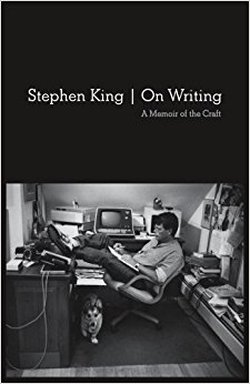 By Chase Harrison It is fitting that Stephen King’s On Writing begins with a preface describing a band that he performs in: the art of music is a generally more personal art than almost any other medium, and this prelude sets up an intimate and wide ranging exploration of the world around King that created the world within his voluminous body of work. Part autobiography and part manual for writers, On Writing is written with the same attention to detail, wry sense of humor, and casual attitude towards the harrowing that marks King’s other works, but in this more personal and casual environment it is fascinating to find how much of his writing persona is found in his own life. The autobiographical portion of the book focuses on King’s relationship with the world of literature, starting with his youthful obsession with horror comic books, cascading through his early days of writing Carrie while working as a high school teacher, and following his ongoing success through to present day. In a classic bit of King intrigue, there is a running, subtle thread underneath much of this portion of the book: King’s alcoholism. In between passages about his rising success and his thoughts about his individual works there are passing references to the fact that his memories of this period are foggy because of how drunk he was for much of that period (in a moment of sad comedy, he notes that he quite likes Cujo, despite the fact that he has no recollection of writing it). It is a thrilling account of the pre-internet process of becoming a famous author, with all the anachronisms and surreal moments that come with that setting, and is a great addition to the Stephen King canon in its own right. The second half of the book is a typically opinionated account of what Stephen King considers to be good writing. The most important passage of the book unfolds when King undergoes an analysis of each of the elements of a book and notes what he likes to see and what he would rather avoid from those elements. Though his descriptions of his enjoyment are enjoyable, it’s more fun (and more educational) when he rips into specific authors and narrative and rhetorical devices that he hates. This is followed by a number of musings on the nature of writing, finishing with a gorgeous passage about the location of his desk, summing up perfectly the balance between art and the artist in unexpectedly saccharine prose from King. On Writing displays the many sides that make up of Stephen King: excellent writer, broken and reformed man, avid consumer of all media, and overall a mind that is among the best of the 20th century. If your goal is to become a master of suspense, you may be disappointed, but if you want to become a better writer and a better person, you can’t do much better than On Writing.
1 Comment
6/27/2017 06:17:19 am
I think guides like this is vital if you wanted to be a writer. I am glad there are guides that are available in the market. You just need to be wise when choosing the right book to buy. Make sure that the author is credible and is recognized. Good luck to your writing career! I wish you the best!
Reply
Leave a Reply. |
Archives
April 2021
Categories |
- Home
- About
-
Issues
-
2024 cover page
>
- Editors' Note (2024)
- Fifty-two Minutes
- The Day I Love Myself More Than You
- Shadows
- Bloodlust: The Metamorphosis
- picture this
- rite of passage
- Bathroom Floor
- Cat
- M
- 삼년상 (Sam-Nyun-Sang)
- Valley
- I'm More Than
- I'm Not a Toy
- Rising Phoenix
- Grow
- Canvas
- red :3
- Green Cousins
- The Lighthouse
- Sea of Plants/Planets
- Kitty's Poem
- Fin
- tomie
- Library Class
- Our Lie
- Weavers
- An Old Tree
- A World Without You
- All Must Die
- Flower
- The Canoe
- It's Scary Up Here
- Beautiful Things
- Ma Vie
- The Final Wall
- Hosts
- Waqe Zhiga
- two faced feelings
- imposter syndrome
- Feminism
- Pretty Girls
- It's Just Us
-
See You in Another World (2023)
>
- Editors' Note (2023)
- Voices of the Summer Night
- Lightning Glut
- All The Little Things
- From a Distance
- Confined
- The Night Hours
- A Contrapuntal for the Girl in My Dreams
- Go Back (before they do)
- Snippet of Thought
- The Darkness
- Her Nature
- I Listen
- Stranger In The City
- What Music Does
- Fallen Stranger
- The Black Dress
-
A Fire of Words (2022)
>
- Editors' Note (2022)
- The Floor Wallows Lower
- Cornflowers
- Erudite
- That One Morning
- mom, im afraid
- selenophilia
- Roses and Rainbows
- If a poisonous snake bites itself, will it die?
- Rochester
- Crown of Branches
- Stairs to the Sea
- A Poem Written Entirely From Advertisements
- Pyromania
- silhouette of a bird against winter stars
- thunderstorm in the bedroom
- A Night in Recovery
- sleeping gypsie
- paper dolls&goodbyes
- We Are Women
- Village Air
- Sunshine's Laughter
- the male gaze
- The Forensic Entomologist
- Lacking
- Drowning
- Adelie
-
Create the Wonders We Dream (2021)
>
- Editors' Note (2021)
- Zove
- I'm Sorry
- Fake Smile
- My Friend the Balloon
- Eyes Intertwined
- Perfect
- Only a Moment
- A Dangerous Word
- My Dreams
- The Last 100 Meters
- The Green Void (Villanelle)
- The Whimsical Galaxy (Sestina)
- The Silent Kindness
- Pressure
- Table on the Hill
- The Yukon
- The Shore
- Repentance
- Her and I
- Infections of the Soul
- Threads
- Dream of a High Schooler
- Empty
- little flame
- scars
- black and white
- The Cat
- Joy
- Sweet Honey Bee Stings
- If There Were One Day
- Delete
- Our Hearts to Central Vietnam
- him or Him?
- Ocean
- Es Llaner Beach
- Sewn Together
- Rain
- Yes, I Like
- The Legacy of the Moon
- The Wind Whimpers
- From Here I See
- To Feel Clean
- Red
- Survival
- Substance
- Golden Lies
- Midnight Tango
- Ode to a Spleen
- Modern Siren
- The Night's Diamond Tears
- Beats In Double Time
- A Day in the Flight
- Carved By Venus
- Lifeline
- Everest
- Education
- How Much of Reality Can Be Observed
- What is a Spork
- What is the difference between love and in love
- What would you have wanted? me to say
- Planet Caravan
- The Journey of a Minute
- The Circus of Scars
- Mosaic
- Color
- Love and Acceptance
-
Colors I Never Knew Existed (2020)
>
- Editors' Note (2020)
- Two Weeks' Notice
- A Curious Man
- An Eternity Swathed in Cobwebs
- Hidden Memories: A Villanelle
- A Better Place
- Conscription
- Just Breathe
- Akko
- The Hungry Dark
- And Then Something Shuffled
- Deodorants are a Girl's Best Friend
- The Old House
- Willow
- Perfection
- She Will Be Queen
- Nothing But Space
- a wicked thing
- Anthony
- Cheesecake
- Za
- Coco
- Coexist
- der böse Mann
- Feeding
- Catharsis
- I HAD TO RENAME THIS POEM DUE TO COPYRIGHT ISSUES
- For All The Kids Who Were Told They'd Never Make It... and Believed This
- i Will Always Love You
- Our 4
- Rainy Day
- Space
- The Ocean Cares Nothing of Man
- Sickly Sweet Love
- I call the eating disorder hotline
- Bright and Sunny Day
- Grandma in the Moon
- Interminable Education in Seventeen Syllables
- Macrocosmic Creation
- Middle Class Psyche
- My Sister
- From a Park Bench
- Rain
- A Recollection of Our Memories
- Sadie Got Me in My Feelings
- Uranium Rose
- When I Grow Up - Paige Rhoads
- Who am I?
- 49-53
-
Words Become Reality (2019)
>
- Editors' Note (2019)
- Bear Down: A Sestina
- Kidnapped & Killed
- Lemonade
- Rise
- Someone Who always Pays
- A Simple Story
- The King's Battle
- Aftermath
- Aging Population
- Can we still be friends?
- Carpe Diem
- Coffee
- Day to Day
- Do Not Hold me Closer, Let me Go
- Gift of Time
- Love Everlasting
- A Message to the Youth
- Peach
- Waiting for the Bell
- Randy
- The River & The Earth
- The Show Goes On
- Summer Love
- Sundae
- West Coast Wishing
-
Watch Every Second (2018)
>
- Editors' Note (2018)
- White
- eleven eleven
- Growing Up
- Claustrophobia
- The Cage
- The Soldier's Return
- Spacing Out
- Depression
- Mona Lisa
- Childhood Cancer
- Puberty
- Languish
- A Magical Ending
- Life
- Barter
- Descent into Space
- Red Water
- The Short Film
- Starting Line
- And I Am From?
- Such a Foreign Concept
- You Say
- My Creator
- The Most Common Illness
- Reflection in Time
- Ode to My Mirror
- Time
- See Me
- Consequences
- Where I'm From
- Unstoppable
- Her Voice Remains (2017) >
-
2024 cover page
>
- Blog
- Submit
- Contact

 RSS Feed
RSS Feed